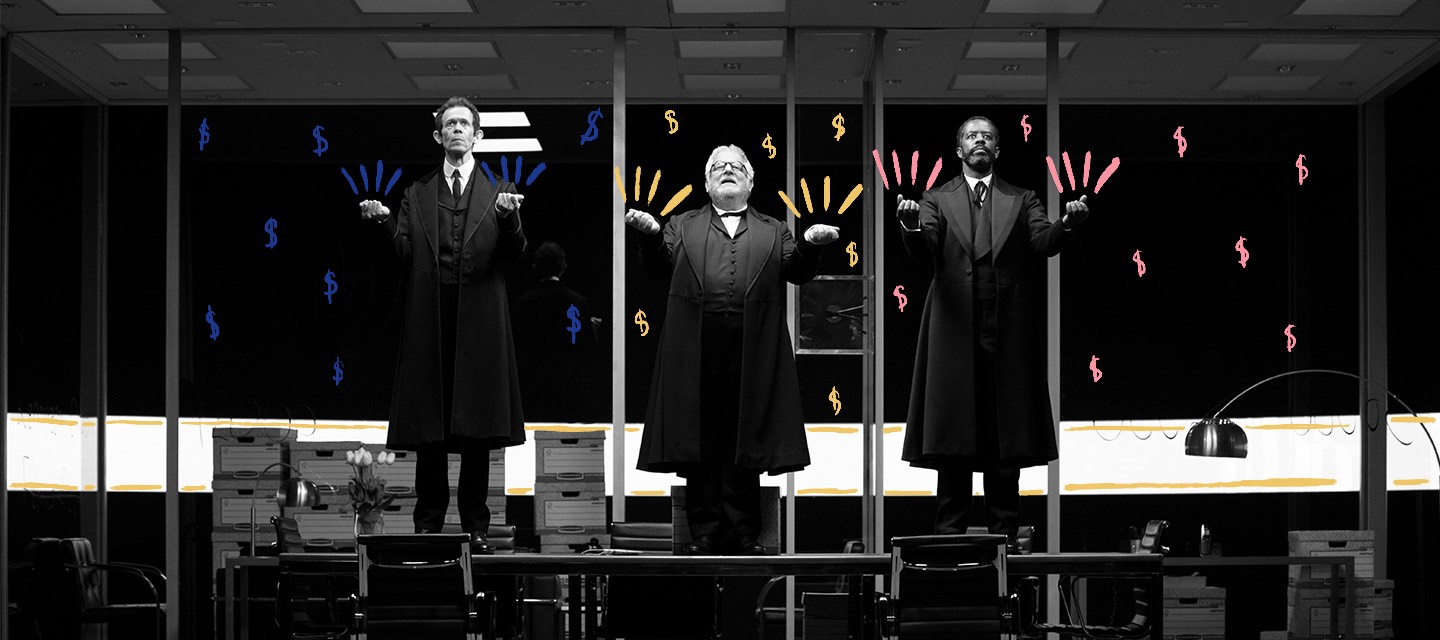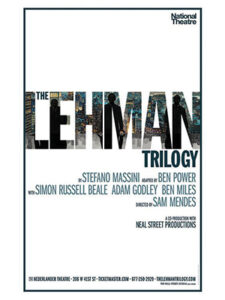

The Lehman Trilogy
Opening Night: October 14, 2021
Closing: January 2, 2022
Theater: Nederlander Theatre
On a cold September morning in 1844, a young man from Bavaria stands on a New York dockside dreaming of a new life in the new world. He is joined by his two brothers, and an American epic begins. 163 years later, the firm they establish – Lehman Brothers – spectacularly collapses into bankruptcy, triggering the largest financial crisis in history.
BUY TICKETSREAD THE REVIEWS:
October 14, 2021
Directed by Sam Mendes, this British import, which reaches across 164 years of American history to trace the family saga behind the fallen financial powerhouse Lehman Brothers, was a scalding-hot ticket during a brief prepandemic run at the Park Avenue Armory. Yet it offers almost nothing in the way of spectacle, and only the slightest of costume changes: a top hat here, a pair of glasses there. In the captivating production that opened on Thursday night at the Nederlander Theater, it relies largely on an unspoken agreement between actors and audience — to imagine together, and let fancy crowd out fact.
READ THE REVIEWOctober 14, 2021
Directed with astonishing grace and ingenuity by Sam Mendes, the Stefano Masinni play, adapted by Ben Power and based on Masinni’s novel, is maybe the single most effective display of imaginative theatrical storytelling since Angels in America landed on Broadway in 1993, a comparison brought to mind by their shared ambition, breadth of style and substance, and deep delight in the inventiveness that transforms everything on stage into a spellbinding demonstration of theater’s possibilities.
READ THE REVIEWOctober 14, 2021
The secret to the production’s success is a paradox: Embedded in this wealth of effects and information are techniques more commonly associated with poor theater. Three exceptional British actors—Simon Russell Beale, Adam Godley and Adrian Lester—play all of the roles, from the founding Lehman Brothers to an assortment of relatives, children, associates and wives. As they shift among personae, often narrating their own characters’ actions, they reshape the set as they go along, using simple cardboard file boxes to evoke different spaces (or metaphorical constructions in sequences that dramatize anxiety dreams, when Hall’s backgrounds are washed in color).
READ THE REVIEWOctober 14, 2021
Still, as a piece of stagecraft, the show is a symphony of theatermakers working at their pinnacle. The actors never stop being wonderful, and the set never stops being handsome, and the music never stops being beautiful. The music box spins on and on. But the play is strongest when talking about the original three Lehmans — the first part of the trilogy would be a standalone masterpiece — and the drama only grows less connected to its characters as it marches down the generations.
READ THE REVIEWOctober 14, 2021
But for all its surface stylishness, “The Lehman Trilogy” is a stolid and rather monolithic slab of a show: a three hour and twenty minute talking Wikipedia page, so dense with description and narration, and devoid of drama — or even dialogue — that watching it is like watching very expensive paint dry, or maybe, to use a more apt metaphor, listening to cotton growing.
READ THE REVIEWOctober 14, 2021
The real question is, why should anyone care about their catalog of wins if no time was going to be invested in analyzing the emotional costs of their devotion to capitalism? While there is a passing reference to the sins of slavery in Act I, as well as signs that these decidedly hetero characters sacrificed their families to success, when it comes to matters of the heart, there is simply no pulse.
READ THE REVIEW

























